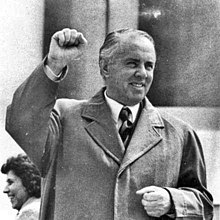Enver Hoxha
Enver Hoxha | |
|---|---|
 Hoxha in c.1971-1972 | |
| First Secretary of the Party of Labour of Albania | |
| In office 8 November 1941 – 11 April 1985 | |
| Succeeded by | Ramiz Alia |
| 2nd Chairman of the Council of Ministers of the People's Republic of Albania | |
| In office 24 October 1944 – 18 July 1954 | |
| Preceded by | Ibrahim Biçakçiu (as Prime Minister of Albania) |
| Succeeded by | Mehmet Shehu |
| Personal details | |
| Born | 16 October 1908 Ergiri (Gjirokastër), Janina Vilayet, Ottoman Empire |
| Died | 11 April 1985 (aged 76) Tirana, People's Socialist Republic of Albania |
| Nationality | Albanian |
| Political party | Party of Labour of Albania |
| Spouse(s) | Nexhmije Hoxha |
| Children | Ilir Sokol Pranvera |
Enver Hoxha (16 October 1908 – 11 April 1985) was an Albanian politician who was dictator of Albania. Ideologically a communist, Hoxha served as prime minister of Albania from 1944 until 1954, and First Secretary of the Party of Labour of Albania from 1941 until his death.
Under his regime, thousands of opponents ("dissidents") were executed, and tens of thousands more were imprisoned in forced labour camps.[1][2]
Early life and Career
[change | change source]Hoxha was born in Gjirokastër, a city in southern Albania (then under the Ottoman Empire) that has been home to many prominent families. He was the son of Halil Hoxha, a Bektashi Tosk cloth merchant who traveled widely across Europe and the United States and Gjylihan (Gjylo) Hoxha. He was raised a member of a wealthy Muslim family of landowners and merchants.[3] He went to the best schools in Albania in the 1920s. He was given one of the few scholarships to a foreign college. In 1931 he attended the University of Montpellier in France.[3] He lost his scholarship in 1934 for poor performance and moved to Paris.[3] During World War II, Hoxha participated in Guerrilla Activities against Germany from 1943 until Albania was Liberated in 1944 by the Soviet Red Army.
In 1944, near the end of the Second World War, he became prime minister of the Democratic Government of Albania, and later, the Socialist Republic of Albania.[4]
Rule (1944 – 1985)
[change | change source]Enver Hoxha was the leader of Albania during that time, known for his isolationist policies and the creation of a tightly controlled state. His rule was marked by suppression of dissent, strict censorship, and a focus on ideological purity. Albania became one of the most isolated and repressive countries in the world under his leadership.
Later Years and Death
[change | change source]In his later years, Evner Hoxha faced health issues including heart problems and diabetes. He passed away on April 11, 1985, due to complications from respiratory and cardiac issues.
References
[change | change source]- ↑ 40 Years of Socialist Albania, Dhimiter Picani
- ↑ "Enver Hoxha: Prime Minister of Albania". Encyclopædia Britannica.
- ↑ 3.0 3.1 3.2 Balkan Strongmen: Dictators and Authoritarian Rulers of South Eastern Europe ed. Bernd Jürgen Fischer (West Lafayette, IN: Purdue University Press, 2007), pp. 241–242
- ↑ Gillian Gloyer, Albania (Chalfont St. Peter: Bradt Travel Guides, 2012), p. 16
| Political offices | ||
|---|---|---|
| Preceded by New creation |
Chairman of the Council of Ministers of Albania 1944–1954 |
Succeeded by Mehmet Shehu |
| Preceded by Omer Nishani |
Minister of Foreign Affairs of Albania 1946–1953 |
Succeeded by Behar Shtylla |

